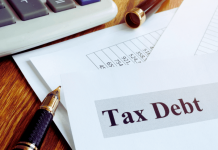Are property tax debts weighing you down? How do you regain control of your finances?
In this article, we'll walk you through 7 practical steps to overcome property tax debt, offering a clear path to financial relief and peace of mind.
Don't let the burden of property tax debt hold you back; take charge of your financial future today and discover the freedom of debt-free living.
Understand Your Property Tax Debt
Property tax assessment is how local authorities determine your property's value for tax purposes, considering size and location.
This valuation serves as the basis for calculating your annual property tax bill, making it essential to understand for accurate tax management.
How Property Taxes Are Calculated
Before we delve into the specifics of property tax calculations, let's briefly explore the key factors that influence how property taxes are determined:
- Property Valuation: The assessed value of your property is a primary factor determined by local tax authorities based on factors like size, location, and property condition.
- Tax Rate: Local governments set tax rates, often expressed as a percentage of your property's assessed value, to generate revenue for essential services.
- Exemptions and Deductions: Special exemptions or deductions vary by location and circumstance and can reduce your property tax liability.
- Assessment Methods: Different regions may use various assessment methods, such as market value or income-based approaches, to calculate property taxes.
- Taxable Improvements: Any additional structures or improvements on your property may also impact your tax liability.

Steps to Determine Your Property Tax Debt
Before diving into the process of identifying your property tax debt, let's outline the essential steps to help you determine the exact amount you owe:
- Locate your property tax bill.
- Check the assessed value and tax rate.
- Calculate the annual tax due.
- Verify outstanding balances.
- Consider exemptions and deductions.
- Review payment history.
- Contact your local tax authority for assistance.
Review Your Budget
Before we dive into reviewing your budget as a crucial step in managing property tax debt, here's a concise breakdown of the critical actions involved:
- Assess Your Finances: Evaluate your current financial situation by examining income, expenses, and savings.
- Create a Detailed Budget: Develop a comprehensive budget listing income sources and monthly expenses.
- Identify Savings Opportunities: Find areas to cut back and save money in your budget.
- Prioritize Debt Repayment: Allocate a portion of your income to pay down property tax debt consistently.
- Consider an Emergency Fund: Set aside funds for unexpected expenses to avoid future setbacks.
- Monitor and Adjust Regularly: Keep a close eye on your finances and adjust your budget as needed.
- Seek Professional Help: Consult a financial advisor if you need expert guidance in managing your finances and debt.
Contact Your Local Tax Authority
Before we explore the vital step of contacting your local tax authority in managing property tax debt, here's a concise guide on what to do:
- Locate Contact Information: Find the contact details for your local tax authority, often available on their website or in official documents.
- Initiate Communication: Contact the tax authority through phone or email to inquire about your property tax debt and payment options.
- Clarify Debt Details: Seek clarification on the amount owed, due dates, and any outstanding balances from previous years.
- Ask About Repayment Plans: Inquire about available repayment plans or options to make paying off the debt more manageable.
- Understand Penalties and Interest: Gain clarity on any penalties or interest charges associated with your debt and how they accrue.
- Verify Exemptions or Discounts: Check if you qualify for exemptions, discounts, or relief programs that may reduce your tax liability.
- Document All Communication: Keep records of all interactions with the tax authority, including dates, names of representatives, and details discussed.
Contacting your local tax authority is crucial to gathering essential information and exploring possible solutions for your property tax debt.
Explore Property Tax Relief Programs
Before we delve into exploring property tax relief programs, let's outline the key steps involved:
- Research Available Programs: Research the various property tax relief programs offered in your area, as eligibility and benefits vary widely.
- Check Eligibility Criteria: Review the eligibility criteria for these programs, which often consider factors like age, income, disability status, or property type.
- Application Process: Understand the application process, including required documentation and deadlines, to ensure you meet all requirements.
- Apply for Relief: Complete and submit the necessary application forms, providing accurate information and documentation as requested.
- Follow-Up: After applying, stay proactive by following up with the relevant authorities to track your application's progress and promptly address any inquiries.
- Stay Informed: Keep informed about any changes or updates to property tax relief programs in your locality to ensure you maximize your benefits.
Exploring property tax relief programs can significantly alleviate your tax burden, so it's essential to be thorough and proactive in your approach.
Develop a Repayment Plan
As we tackle the critical step of developing a repayment plan for managing property tax debt, here's a concise guide to help you take the proper steps:
- Set Realistic Goals: Begin by establishing achievable debt repayment goals.
- Create a Clear Plan: Develop a structured repayment plan for your budget.
- Prioritize Your Debt: Make property tax debt a top financial priority.
- Consider Lump Sum Payments: Explore lump sum payment options to reduce the debt.
- Automate Payments: Set up automatic payments to avoid missing deadlines.
- Stay Disciplined: Adhere to your plan and avoid diverting funds.
- Be Flexible: Be prepared to adjust the plan if your circumstances change.
Consider Property Tax Financing
As we explore the option of property tax financing as a means to manage property tax debt, here's a concise guide to help you understand this approach:
- Understanding Property Tax Financing: It spreads out property tax payments, reducing immediate financial strain.
- Pros and Cons: Weigh the benefits, like improved cash flow, against potential drawbacks like interest costs.
- Application Process: Learn how to apply through the tax authority or third-party lenders.
- Repayment Terms: Review interest rates and repayment schedules to make an informed decision.
- Assess Your Finances: Ensure property tax financing aligns with your financial goals.
- Explore Alternatives: Before committing, consider other ways to pay off your property tax debt.
Seek Professional Assistance
As we discuss the importance of seeking professional assistance when managing property tax debt, here's a concise guide to help you make informed decisions:
- Assess the Need: Determine when professional help is required based on your financial situation and debt complexity.
- Types of Professionals: Explore advisors, planners, or counselors with property tax and debt expertise.
- Choose Wisely: Select the right expert for your situation.
- Initial Consultation: Schedule a consultation to evaluate their suitability.
- Cost Considerations: Understand and budget for their fees.
- Follow Guidance: Act on their recommendations to manage property tax debt effectively.
The Bottomline
In conclusion, tackling property tax debt may seem daunting, but with these seven practical steps, you can control your financial future.
From understanding your debt to seeking professional guidance, these actionable measures empower you to overcome property tax challenges.
Taking decisive action today can pave the way toward a debt-free and financially secure tomorrow.



